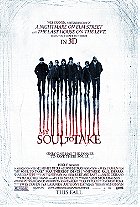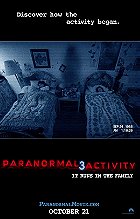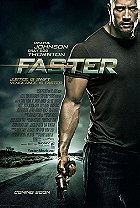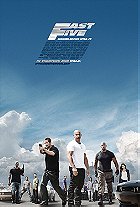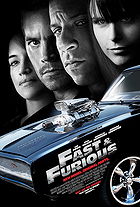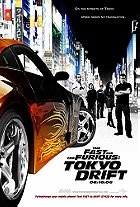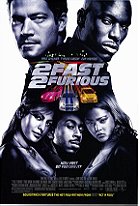2011's Drive is the American filmmaking debut for Danish director Nicolas Winding Refn, best known for films like Valhalla Rising, Bronson, and the Pusher trilogy. Not all foreign directors are an ideal fit for Hollywood, but the transition does not force Refn to suppress his directorial trademarks or neglect the critical elements that constitute a great movie. At face value, Drive may seem like a straightforward action flick, but it is far more than that - it is a riveting, multifaceted masterpiece that reinvigorates its ostensibly unoriginal narrative pieces and masterfully draws you into its unpredictable narrative. Entrancing and compelling, Drive will give mainstream audiences a thrill, but cinema enthusiasts will undoubtedly get the most out of the film and appreciate everything it has to offer.
The movie's protagonist does not have a name; he is simply The Driver (Ryan Gosling). An extremely proficient wheelman, the Driver works as a car mechanic for auto shop owner Shannon (Bryan Cranston), who also coordinates the Driver's additional jobs: performing car stunts in Hollywood movies and moonlighting as a getaway driver for criminals. However, the Driver is gearing up to move into stock car racing, with Shannon convincing Jewish-American mobster Bernie Rose (Albert Brooks) to cover the cost of a suitable vehicle. However, the Driver's life drastically changes when he meets his new neighbour, Irene (Carey Mulligan), and her young son Benicio (Kaden Leos). Irene and the Driver develop a low-key, flirtatious relationship, which is interrupted when Irene's criminal husband, Standard (Oscar Isaac), is released from prison. Standard soon finds himself in trouble with an Albanian gangster, Chris Cook (James Biberi), who demands prompt payment for the protection money he owes. With Standard's situation threatening the safety of Irene and Benicio, the Driver steps up to help, offering to act as a wheelman for Standard and Cook's accomplice, Blanche (Christina Hendricks), as they rob a pawn shop. From this point onwards, things start to go awry, with the Driver trying to protect Irene and Benicio while dealing with violent mobsters.
Drive is an adaptation of James Sallis's acclaimed 2005 noir novel of the same name, with Hossein Amini (2010's Shanghai) penning the screenplay. Amini's shooting script was a scant 81 pages (Sallis's book was also short at 158 pages), yet Refn and Gosling continually worked to trim dialogue during shooting. Refn's style favours showing instead of telling, with the director staging touching character moments between the Driver and Irene without a single spoken word. For example, one memorable elevator scene contains no dialogue, but the imagery powerfully conveys what the Driver and Irene are feeling. Additionally, Refn creates breathtaking montages to show the Driver becoming acquainted with Irene and Benicio, and these moments eschew dialogue, as we do not need to learn more about the Driver's past or his character's psychology. It's a refreshing approach, making Drive feel even more distinctive. The montages do not amount to lazy padding; instead, they are an organic part of Refn's European cinematic voice.
Labelling Drive as "the arthouse Transporter" or "The Transporter for smart audiences" may seem apt, but the designation sells both flicks short. The Transporter films are brainless but entertaining, while Drive is more than just a superior version of them. Refn's film is unique and defies easy categorisation - in fact, it feels like a Coen Brothers picture (think No Country for Old Men or Miller's Crossing) but without the self-aware quirkiness. Drive is a character-driven mood piece, concerned with compelling drama rather than pure action, though Refn sprinkles a few vicious action beats throughout the picture's breezy 100-minute duration. The narrative flow does not reek of Hollywood convention but of innovation and intelligence, and it is hard to predict what will happen next. Additionally, with the freedom of an R-rating, Refn does not hold back on the violence, as there are several shocking moments of brutal bloodshed. However, the unsettling content is not for cheap thrills; instead, it augments the stakes and introduces a genuine sense of danger while maintaining a sense of tact to prevent the violent moments from feeling like exploitative gore porn. Luckily, there is also levity amid the brutality, with a few moments of humour to lighten the tone.
Drive carries a wonderfully retro look and feel. Refn's cinematic style harkens back to the '70s and '80s, down to the neon pink cursive font of the opening titles. The soundtrack bursts with beautiful, moody '80s-inspired synth beats courtesy of Cliff Martinez, whose enthralling score adds momentum, tension, and flavour, while the song choices also perfectly accompany the distinctive aesthetic style. The opening credits follow the Driver around Los Angeles, set to the tune of "Nightcall" by French artist Kavinsky, perfectly introducing this world and this character. Meanwhile, the film's aural soul is the recurring "A Real Hero" (by College feat. Electric Youth), which sounds like an '80s tune in the style of Tangerine Dream despite being relatively new. Drive features other songs that would have no place in a mainstream action film, and they enhance the picture's sense of cinematic personality. Refn is an artistic filmmaker, and it seems the director heavily considered every shadow, beam of light, angle and frame, leading to an enthralling sense of authority and atmosphere.
Newton Thomas Sigel's crisp digital cinematography is just as assured as Refn's direction, as Drive carries an immense sense of visual gravitas. Refn and Sigel also employ interesting camera techniques, such as a split screen during a phone conversation between the Driver and Irene. Additionally, the director is not afraid of pauses, as the camera lingers on characters while they contemplate their actions and process what is happening, but the shrewd editing by Matthew Newman (Valhalla Rising, Bronson) ensures the movie never devolves into tedium. Shooting on location throughout Los Angeles heightens the picture's sense of authenticity and atmosphere, with stunning neon-soaked nighttime cityscapes. There is no digital artifice or green screening during the driving sequences, as the production features practical stunts and real driving. The car chases are sleek and gripping, and Refn alternates his approach to keep things interesting, opening the feature with a pursuit through the streets of L.A., during which the camera remains inside the car alongside the Driver.
Further contributing to Drive's technical virtuosity is the engaging sound design, which received recognition with an Academy Award nomination for sound effects editing (the movie's sole Oscar nod). Drive is tailor-made to be seen in a cinema on a large screen with surround speakers to emphasise the engrossing sound design. Indeed, this is a true cinematic experience - a motion picture that grips and mesmerises you through masterful filmmaking and refuses to let you go until the end credits appear. The fact that Refn could execute such a technically immaculate picture on a relatively small $15 million budget seems miraculous. Indeed, straight-to-video movies with a similar price tag do not come close to matching Drive's intoxicating sense of cinematic style and personality.
A few years ago, movie-goers perceived Ryan Gosling as "that pretty boy from The Notebook." However, Gosling reinvented himself by taking on complex, memorable roles in films like Lars and the Real Girl, Blue Valentine, Crazy, Stupid, Love., and now Drive. This role is a perfect fit for Gosling, who delivers an absorbing performance with minimal dialogue, creating a role with shades of Clint Eastwood and Steve McQueen. The performance is not contrived, as his soft-spoken persona feels entirely organic. Meanwhile, Carey Mulligan (An Education) imbues her character with nuance and emotional depth, ensuring Irene is not a thankless love interest. Mulligan possesses the correct type of innocent look and sweet nature to make the character believable, and her acting maturity is second to none. Also in the cast is Bryan Cranston (Breaking Bad), who once again shows his incredible range by giving Shannon genuine humanity and personality. Ron Perlman (Hellboy) and Oscar Isaac (a future Star Wars star) are also effective, adding genuine depth to their respective roles, while Christina Hendricks (Mad Men) makes a terrific impression with a wholly convincing performance. But the real standout is Albert Brooks (Marlin from Finding Nemo), who plays against type as the menacing Bernie. Brooks carries a genial nature, which makes his penchant for violence all the more shocking.
Drive is a touching love story, a brutal action movie, and a tense crime thriller, but it is not tonally schizophrenic, as Refn nails each style and navigates between them with assurance and dexterity. Refn's American filmmaking debut feels distinctly European in its execution but follows a more pronounced narrative than several of the director's Danish films, resulting in incredible momentum and pacing while maintaining astonishing artistic integrity. It's hard to pinpoint a singular reason why Drive is such a gem, as everything is perfect: the pacing, direction, acting, dialogue, photography, editing, and music combine to create one of the most memorable and brilliantly unpredictable movies in years. Drive is both arthouse at its finest and action at its finest - in fact, it is the only arthouse movie in recent memory with tremendous replay value.
10/10
 Login
Login
 Home
Home 183 Lists
183 Lists 1670 Reviews
1670 Reviews Collections
Collections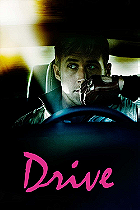




 0 comments,
0 comments, 